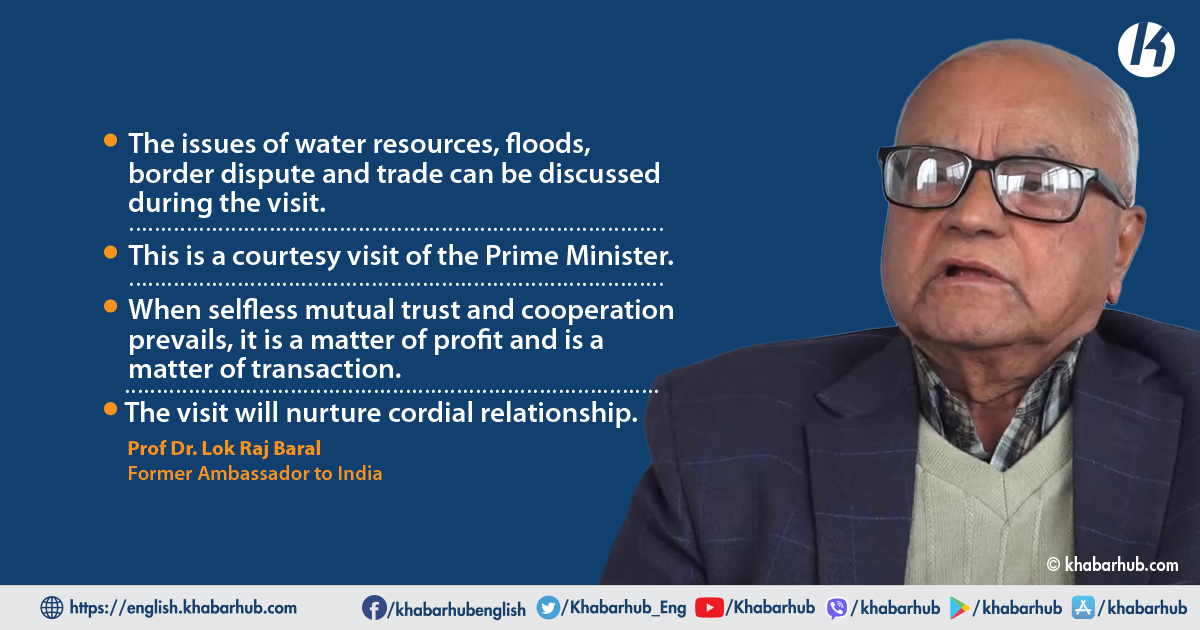Dr. Lokraj Baral is a professor, diplomat and political analyst. Dr. Baral, who has been teaching at the university for almost 36 years, has been the head of the political science department for 12 years.
Baral, who had been Nepal’s ambassador to India for 15 months, is well-versed in Nepal-India relations.
Khabarhub approached to Dr. Baral for a talk on the eve of Prime Minister Sher Bahadur Deuba’s India visit scheduled for April 1. Here are the excerpts of the talk:
How do you see the visit of Prime Minister Sher Bahadur Deuba to India, which is three months behind schedule?
This is more of an honor given by India to Nepal’s Prime Minister Sher Bahadur Deuba than the subject of a halted visit to India. India seems to have done so with a view to furthering and improving relations with Nepal. But, I don’t think there is any fundamental change in the agenda.
What are the issues that Prime Minister Deuba should raise during his visit to India?
Nepal has already raised many issues. There is no need to raise new issues. The issues raised earlier have not been managed and settled yet. There are the issues of floods, the border dispute between Nepal and India and many more. The border dispute is a big issue. Settling the boundaries in a single visit is not possible. The issue of Kalapani Lipulek and Limpiyadhura can also be raised. But, that would be a very lengthy process. However, initiations have to be taken.
We should also look at the issue of floods and landslides. We need to look at the issue of Nepal’s trade relations. There are a number of issues that are not covered, such as security concerns.
In my opinion, all the agendas have been set. We need to talk about those agendas. Why was the construction of postal highway delayed? Is Nepal also to be blamed for this or not? However, the land has not been acquired in time. This may be Nepal’s fault.
Nepal has a multifaceted relationship with India. What are the areas where Nepal can benefit?
Nepal will benefit from the goodwill of both. When selfless mutual trust and cooperation prevails, it is a matter of profit and a matter of the transaction. We should recall that we shared big dreams while passing the Mahakali Treaty. The treaty was ratified with two-thirds majority. However, we couldn’t do anything. We have many weaknesses in this. India did not pay much attention to that either. There is always talk of nationalism in Nepal. There are issues of water resources. As mentioned earlier, there is the problem of floods. There are border disputes. The government should think about reducing the trade deficits and increasing production. There are many things we need to take advantage of.
It seems that Nepal has not prepared enough for the Prime Minister’s visit. What can be done before this visit?
Interestingly, the Ministry of Foreign Affairs has said nothing till now. The Prime Minister is scheduled to visit India. Talks are scheduled for Friday and Saturday and return via Banaras on Sunday. The main thing is that the common Nepali is interested in whether Nepal has anything to do with Lipulek, Limpiyadhura and Kalapani border. Even if Nepal raises the issue, India will probably discuss it later. There are many other issues raised earlier yet passing unnoticed. They should be heeded.
How do you see Nepal’s current neighborly relations and foreign policy?
One might hold different perspectives on foreign policy. Looking at the neighborly relationship for a year or two, it seemed to turn distrustful and inflexible. India seemed watching less eagerly before. China has also not taken care of Rasuwagadi Tatopani. In terms of BRI too, KP Oli-led government also could not forward it though it was lying there for five years. Nepal-China-India relations are fine. There were a few things that required better attention. However, few remarkable things occurred during the short tenure of Prime Minister Sher Bahadur Deuba.
China may have felt the need to deal with the government as its attempt to reconcile the communist parties here did not succeed. Although the communists came to power, the two-third majority government could not function well. Lately, the Millennium Challenge Cooperation (MCC) compact got ratified with the support of the communists. So, China might have started thinking the Deuba government deserves further cordial relationship. This factor might have induced the Chinese Foreign Minister for a Nepal visit.
China also seems to be trying to normalize the fact that its relations with India are good. They might have some issues at their border, however, the relationship is not so cold. The relationship seems to be moving forward a bit. The upcoming visit to India after the MCC agreement and the visit of the Chinese Foreign Minister to Nepal can be considered as positive indication. In conclusion, the relationship is fine. However, Nepal India relationship deserves better journey ahead.
It is said that Nepal’s diplomatic situation has not been balanced. How do you take it?
Nepal’s diplomatic situation has continued like this. Not only now, looking at the history from the Rana regime to 1950s, there is such an unbalanced policy. When relationship with one goes better the other turns skeptic.
India was also skeptical when King Mahendra built the Kodari Highway. India had suspected that communism would come to Nepal after China opened the Himalayan routes. It has been going on from time to time. Our foreign policy needs to be strengthened. Further research has to be done with the help of experts.
There should be experts discussing long-term, short-term issues of concern. There is a need to produce research experts in the universities.
Now everyone acts as an expert. Everybody has become an expert by showing their face once or twice in one or two media. There are some foreign scholars. Some are media experts!
How do you see India’s Nepal policy?
India’s Nepal policy is not remarkably different now. Cultural ties: they are strong. India has been watching normally. There was a little ‘nationalism’ in then Prime Minister KP Oliji’s mind. India was fixing it, by sending several envoys and the president of RAW to normalize it. India has not expressed full consent to our constitution. It has merely ‘noted’ the Constitution. There is no trust in the relationship, the relationship is not broken either.
Finally, what else can be expected from the Prime Minister’s visit to India?
I do not expect much. The only plan is to nurture harmony. It is to create an atmosphere of good relations between the two countries. Nepal cannot change the basics. Nepal’s leaders cannot do this and neither does India. Even though they labeled the 1950’s treaty unequal, it could not be repealed. India may be more comfortable with the current Sher Bahadur Deuba-led government. I don’t think the trip will be much sounding. It is a normal meeting, a courtesy call. I don’t think there will be a new breakthrough.









Comment